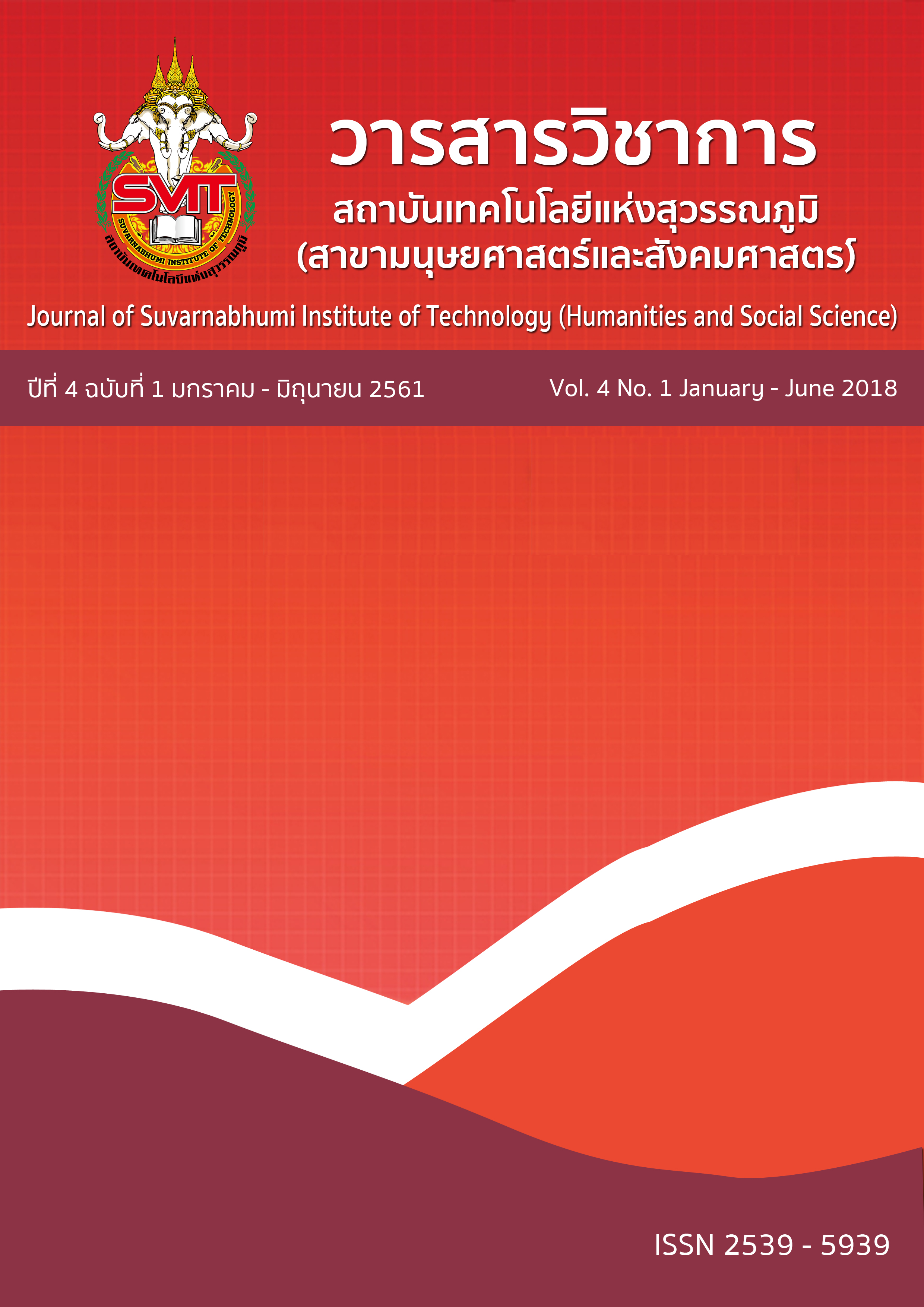USING THE ADVANTAGES FROM E-JAN FACEBOOK FANPAGE OF STUDENTS AT SAKON NAKHON RAJABHAT UNIVERSITY
Keywords:
Facebook fan page, Exposure, UsingAbstract
The objectives of this study were to study the characteristics, of Sakon Nakhon Rajabhat Universe students to study students’ behavior of surfing on E-Jan Facebook fan page to study the benefit of E-Jan Facebook fan page and To compare the utility of surfing E-Jan Facebook fanpang of 400 Sakon Nakhon Rajabhat Universe students the sample group were selected by Probability sampling, Class chart, simple random sampling method statistics used in data analysis included frequency, Percentage mean, standard deviation, one way ANOVA, Post hoc test using Least Significant Differences (LSD)
The finding of this study;
Most of the samples were females between the ages of 18 and 22 who were studying in the third year under the management of the Faculty of Management Science Information on Facebook Fan Page 1 - 5 times per week Connect Facebook fan page 1 - 3 hours per session from 18.01 - 22.00 to keep up with the news, especially the news of crime And have access to find out more.
For the use of E-Jan Facebook fan page, the fans of the sample were mostly at the high level most of them want to know the information and bring the event to life. Hypothesis of the study found that the different gender of them has the different ways of gaining the benefit at the .05 level of significant. The age group is studying. And the faculty the use of E-Jan Facebook fan page is not different.
References
กิตติ กันภัย. (2556). การวิเคราะห์ผู้รับสารสื่อมวลชน. กรุงเทพฯ: เหรียญบุญการพิมพ์ (1988).
จิตรา เอื้อจิตรบำรุง. (2544). การเปิดรับข่าวสาร การใช้ประโยชน ์และความพึงพอใจ ต่อข้อมูลข่าวสารยาแก้ปวดลดไข้ที่โฆษณาผ่านสื่อมวลชนของประชาชนในเขตกรุงเทพมหานคร. วิทยำนิพนธ์มหาบัณฑิต คณะวารสารศาสตร์และสื่อสำรมวลชน มหาวิทยาลัยธรรมศาสตร์.
บัณฑิต รอดทัศนา. (2554). พฤติกรรมการใช้เฟสบุ๊คและความพึงพอใจต่อการบริหาความสัมพันธ์ลูกค้าผ่านเฟสบุ๊คคิง เพาเวอร์. (นิเทศศำสตรมหาบัณฑิต, มหำวิทยาลัยหอการค้าไทย).
พิชญาวี คณะผล.(2553). การศึกษาทัศนคติ การใช้ประโยชน์ และความพึงพอใจของการสื่อสารผ่านเครือข่ายสังคมออนไลน์ กรณีศึกษา: นักศึกษาและบุคลากรวิทยาลัยเฉลิมกาญจนา จ.เพชรบูรณ์. (กำรศึกษาค้นคว้าอิสระปริญญามหาบัณฑิต, มหาวิทยาลัยธุรกิจบัณฑิตย์).
ภิเษก ชัยนิรันดร์. (2553). การตลาดแนวใหม่ผ่าน Social Media. กรุงเทพฯ: โอเดียนสโตร์.
ภาณุวัฒน์ กองราช. (2554). การศึกษาพฤติกรรมการใช้เครือข่ายสังคมออนไลน์ของวัยรุ่นในประเทศไทย กรณีศึกษา Facebook. (วิทยำนิพนธ์วิทยศาสตรมหาบัณฑิต, มหาวิทยาลัยธรรมศำสตร์).
วิภำวี จันทร์แก้ว (2560). พฤติกรรมการเปิดรับสื่อ ทัศนคติ และการใช้ประโยชน์ กรณีศึกษาเฟซบุ๊กแฟนเพจดังตฤณแฟนคลับ. Journal of Communication and Management NIDA Volume 2 Number 1 (January – April 2016). 134 – 152.
ศิวัช จันทนาสุภาภรณ์. (2554). ทัศนคติที่มีต่อการเปิดรับสื่อออนไลน์บนเครือข่ายสังคมออนไลน์ กรณีศึกษานักศึกษามหาวิทยาลัยเทคโนโลยีราชมงคลธัญบุรี. (บริหารธุรกิจมหาบัณฑิต, มหาวิทยาลัยเทคโนโลยีราชมงคลธัญบุรี).
สกุลศรี ศรีสารคาม. (2554). สื่อสังคม (Social Media) กับการเปลี่ยนแปลงกระบวนการสื่อข่าว. (คณะนิเทศศำสตร์, มหาวิทยาลัยธุรกิจบัณฑิตย์).
Klapper, J. T. (1960). The effects of mass communication. New York: Free Press.
Quinn, K. (2016). Why We Share: A Uses and Gratifications Approach to Privacy Regulation in Social Media Use. Journal of Broadcasting & Electronic Media Research, 6 0(1), 61-86.
Raacke, J.,& Raacke, J. B. (2008). Myspace and facebook applying the uses andgratifications theory to exploring friend networking sites [Electronics version]. CyberPsychology & Behavior, 11(2), 169-174.
Schramm, Wilbur. (1971). The process and effect of mass communication. Urbana: University ofIllinois Press. แนวโน้ม พฤติกรรมการใช้ และความเปลี่ยนแปลงของโซเชียลมีเดีย. สืบค้นจำก http://www.trendy2.mobi/2017/05/thailand-zocial-award-2017/. 1 กรกฎำคม 2560
Shade, D. D., Kornfield, S., and Oliver, M. B. (2015). The Uses and Gratifications of Media Migration: Investigating the Activies, Motivations, and Predictors of Migration Behaviors Originating in Entertainment Television. Journal of Broadcasting & Electronic Media Research, 59(2), 318-341.
Downloads
Published
Issue
Section
License
The articles published are copyrighted by the Sarasas Journal of Humanities and Social Science. The opinions expressed in each article in this academic journal are those of the individual authors and do not reflect the views of Sarasas Suvarnabhumi Institute of Technology. The authors are solely responsible for all aspects of their respective articles. Any errors or inaccuracies in the articles are the sole responsibility of the authors.



